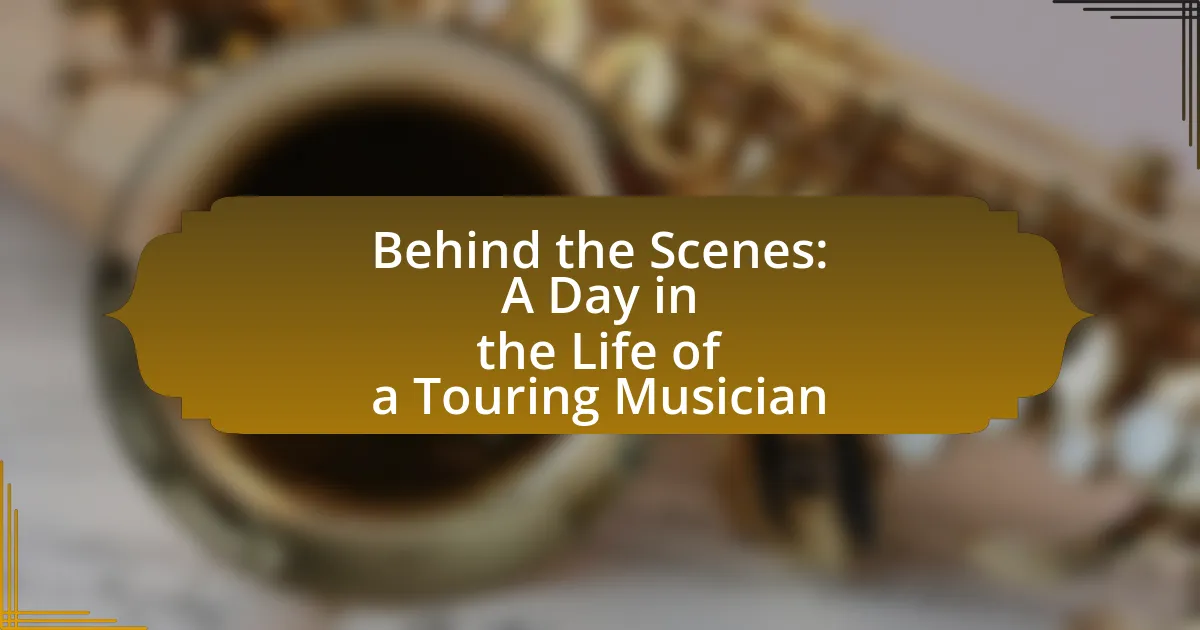The article “Behind the Scenes: A Day in the Life of a Touring Musician” provides an in-depth look at the daily routines, challenges, and preparations of musicians on tour. It covers aspects such as travel logistics, sound checks, performance preparation, and the emotional and physical demands faced by artists. Additionally, the article discusses the importance of teamwork, time management, and self-care strategies, as well as the financial implications of touring. Insights into maintaining personal relationships and coping with stress further highlight the complexities of a musician’s life on the road.

What does a typical day look like for a touring musician?
A typical day for a touring musician involves a structured routine that includes travel, rehearsals, sound checks, and performances. Musicians often start their day with travel to the next venue, which can involve long hours on a tour bus or flights. Upon arrival, they usually have a sound check to ensure the audio equipment is functioning properly and to fine-tune their performance. After sound check, there may be time for rest or additional rehearsals before the concert.
During the day, musicians also engage in promotional activities, such as interviews or meet-and-greets with fans. The evening culminates in the live performance, which can last from one to three hours, followed by post-show activities like merchandise sales or socializing with fans. This routine is consistent across various tours, highlighting the demanding schedule that touring musicians maintain.
How do musicians prepare for a day on tour?
Musicians prepare for a day on tour by organizing their schedules, rehearsing, and ensuring their equipment is ready. They typically start the day with a soundcheck to test audio levels and make necessary adjustments. Following this, they often engage in physical and vocal warm-ups to maintain their performance quality. Additionally, musicians review setlists and may practice specific songs to enhance their readiness. They also coordinate with their crew to confirm logistics, such as transportation and accommodations, ensuring everything runs smoothly. This preparation is crucial, as it directly impacts their performance and audience experience.
What routines do musicians follow before a performance?
Musicians typically follow a series of routines before a performance that include warm-up exercises, sound checks, and mental preparation. Warm-up exercises often involve vocal or instrumental practice to ensure optimal performance quality, as studies show that physical warm-ups can enhance muscle readiness and reduce the risk of injury. Sound checks are crucial for adjusting audio levels and ensuring that instruments and vocals are balanced, which is supported by the fact that a well-conducted sound check can significantly improve the overall concert experience. Mental preparation may involve visualization techniques or relaxation exercises to reduce performance anxiety, as research indicates that mental rehearsal can enhance performance outcomes.
How do musicians manage their time during the day?
Musicians manage their time during the day by creating structured schedules that balance practice, performances, and personal activities. They often allocate specific hours for rehearsing, songwriting, and engaging in promotional activities, ensuring that each aspect of their career receives adequate attention. For instance, a typical day may include several hours dedicated to instrument practice, followed by meetings with band members or management, and time set aside for social media engagement to connect with fans. This structured approach allows musicians to maximize productivity while maintaining their artistic integrity and personal well-being.
What challenges do touring musicians face daily?
Touring musicians face numerous daily challenges, including physical exhaustion, logistical issues, and emotional stress. The demanding schedule often requires long hours of travel, leading to fatigue that can impact performance quality. Logistically, musicians must coordinate transportation, accommodations, and equipment setup, which can be complicated by factors such as traffic, venue restrictions, and last-minute changes. Additionally, the emotional toll of being away from family and friends, coupled with the pressure to perform consistently, can lead to mental health struggles. According to a study published in the Journal of Music Therapy, musicians on tour report higher levels of anxiety and depression compared to their peers in stable environments, highlighting the significant psychological challenges they face.
How do musicians cope with fatigue and stress on tour?
Musicians cope with fatigue and stress on tour by implementing structured routines, prioritizing rest, and utilizing relaxation techniques. They often schedule downtime between performances to recharge, ensuring adequate sleep and nutrition to maintain energy levels. Additionally, many musicians engage in mindfulness practices, such as meditation or yoga, to manage stress effectively. Research indicates that regular physical activity and social support from bandmates also play crucial roles in enhancing resilience against the pressures of touring. For instance, a study published in the Journal of Music Therapy highlights that musicians who practice self-care strategies report lower levels of stress and fatigue during tours.
What logistical issues arise during a touring day?
Logistical issues that arise during a touring day include transportation delays, equipment setup challenges, and scheduling conflicts. Transportation delays can occur due to traffic, vehicle breakdowns, or unforeseen circumstances, impacting the timely arrival at venues. Equipment setup challenges often involve coordinating the arrival and assembly of instruments and sound systems, which can be complicated by limited space or technical difficulties. Scheduling conflicts may arise when multiple events or commitments overlap, leading to potential miscommunication among crew members and artists. These factors can disrupt the overall flow of the day, affecting performance quality and audience experience.
What role does teamwork play in a touring musician’s day?
Teamwork is essential in a touring musician’s day as it ensures the smooth execution of performances and logistics. Each member of the touring crew, including sound engineers, roadies, and management, collaborates to create a cohesive experience for the audience. For instance, effective communication among team members allows for quick problem-solving during live shows, which is critical given the unpredictable nature of touring. Studies show that high-functioning teams can increase performance quality and reduce stress, highlighting the importance of teamwork in maintaining both the artist’s and crew’s well-being on the road.
How do musicians collaborate with their crew and bandmates?
Musicians collaborate with their crew and bandmates through structured communication, shared goals, and coordinated efforts during rehearsals and performances. Effective collaboration involves regular meetings to discuss setlists, stage setups, and technical requirements, ensuring that everyone is aligned on the artistic vision. For instance, during rehearsals, musicians work closely with sound engineers to fine-tune audio levels and with lighting technicians to synchronize visual effects with the music. This teamwork is essential for creating a cohesive live performance, as evidenced by the fact that successful tours often rely on the seamless integration of various roles, from musicians to roadies, to deliver a polished show.
What communication strategies are essential for a successful tour?
Effective communication strategies essential for a successful tour include clear coordination among team members, regular updates, and audience engagement. Clear coordination ensures that all crew members, including sound engineers, roadies, and management, understand their roles and responsibilities, which minimizes confusion and enhances efficiency. Regular updates, such as daily briefings or check-ins, keep everyone informed about schedule changes, venue specifics, and any potential issues, fostering a proactive approach to problem-solving. Audience engagement through social media and direct interaction during performances builds a connection with fans, enhancing their experience and promoting the tour. These strategies collectively contribute to a seamless touring experience, as evidenced by successful tours that prioritize communication, such as Taylor Swift’s “Reputation Stadium Tour,” which utilized extensive team briefings and fan interaction to achieve record-breaking attendance.

How do musicians balance personal life and touring commitments?
Musicians balance personal life and touring commitments by implementing structured schedules and prioritizing communication with family and friends. They often allocate specific time slots for personal interactions, ensuring they maintain relationships despite being on the road. For instance, many musicians use technology, such as video calls and messaging apps, to stay connected with loved ones while touring. Additionally, some musicians schedule breaks between tours to recharge and spend quality time with family, which helps mitigate the emotional strain of prolonged touring. This approach is supported by studies indicating that maintaining social connections is crucial for mental well-being, particularly in high-stress professions like music.
What sacrifices do musicians make while on tour?
Musicians make significant sacrifices while on tour, including time away from family and friends, loss of personal privacy, and physical exhaustion. The demanding schedule often requires them to perform multiple shows in different cities, leading to long hours of travel and limited downtime. According to a study published in the Journal of Music Therapy, musicians frequently report feelings of isolation and stress due to the constant movement and lack of stable home life. Additionally, the financial strain can be considerable, as expenses for travel, accommodation, and equipment often exceed earnings from performances. These factors contribute to the overall challenges faced by musicians during tours.
How does touring affect relationships with family and friends?
Touring often strains relationships with family and friends due to prolonged absences and the demanding schedule of musicians. The constant travel and performance commitments can lead to feelings of isolation for both the touring musician and their loved ones, as quality time together becomes limited. Research indicates that musicians frequently report challenges in maintaining personal relationships while on tour, with 70% citing difficulties in communication and emotional connection during extended periods away from home. This dynamic can result in misunderstandings and a sense of disconnect, impacting the overall quality of those relationships.
What strategies do musicians use to maintain personal connections while touring?
Musicians use various strategies to maintain personal connections while touring, including regular communication through phone calls, video chats, and social media. These methods allow them to stay in touch with family and friends despite being on the road. Additionally, many musicians schedule time for personal visits during tour stops, ensuring they can connect face-to-face with loved ones. They also often share their experiences and daily life on social media platforms, which helps to keep their relationships active and engaged. Research indicates that maintaining these connections can significantly reduce feelings of loneliness and isolation, which are common challenges faced by touring artists.
How do musicians find time for self-care on the road?
Musicians find time for self-care on the road by incorporating structured routines and prioritizing wellness activities. They often schedule specific times for exercise, meditation, or relaxation amidst their busy tour schedules. For instance, many musicians utilize downtime between soundchecks and performances to engage in physical activities like yoga or jogging, which helps maintain their physical health and mental clarity. Additionally, some musicians practice mindfulness techniques or use apps for guided meditation to manage stress effectively while traveling. This approach is supported by studies indicating that regular physical activity and mindfulness practices can significantly enhance well-being, particularly in high-pressure environments like touring.
What practices do musicians adopt to stay healthy while touring?
Musicians adopt various practices to stay healthy while touring, including maintaining a balanced diet, staying hydrated, and incorporating regular exercise into their routines. A balanced diet helps musicians sustain energy levels and supports overall health, while hydration is crucial for vocalists to maintain vocal quality and prevent fatigue. Regular exercise, such as stretching or yoga, aids in preventing injuries and alleviating stress from long hours of travel and performance. Additionally, many musicians prioritize sleep hygiene to ensure adequate rest, which is essential for physical and mental well-being during demanding tour schedules.
How important is mental health awareness for touring musicians?
Mental health awareness is critically important for touring musicians due to the unique stressors they face, including long hours, constant travel, and the pressures of performance. These factors can lead to mental health issues such as anxiety, depression, and substance abuse. Research indicates that musicians are at a higher risk for mental health problems compared to the general population; a study published in the Journal of Affective Disorders found that 71% of musicians experience anxiety and 68% experience depression. Therefore, promoting mental health awareness can help mitigate these risks, providing musicians with the necessary resources and support to maintain their well-being while on tour.
What are the financial implications of touring for musicians?
Touring has significant financial implications for musicians, often determining their overall income and career sustainability. While successful tours can generate substantial revenue through ticket sales, merchandise, and sponsorships, they also incur high costs such as travel, accommodation, and crew salaries. For instance, a 2019 report by the Music Industry Research Association indicated that average touring expenses can consume up to 70% of gross revenue, highlighting the financial risks involved. Additionally, musicians may face fluctuating income due to varying ticket sales and market demand, making financial planning crucial for long-term success.
How do musicians budget their expenses while on tour?
Musicians budget their expenses while on tour by creating detailed financial plans that account for all anticipated costs. These costs typically include transportation, accommodation, food, equipment rental, and crew salaries. To ensure accuracy, musicians often analyze previous tour budgets and adjust for variables such as location and duration. For instance, a study by the Music Industry Research Association found that touring expenses can range from 30% to 50% of total revenue, emphasizing the importance of meticulous budgeting. By tracking expenses in real-time and adjusting their plans as needed, musicians can maintain financial control throughout their tours.
What revenue streams are available to touring musicians?
Touring musicians have several revenue streams available to them, including ticket sales, merchandise sales, sponsorships, and streaming royalties. Ticket sales generate the primary income during live performances, with successful tours often grossing millions; for example, the highest-grossing tours can exceed $300 million in ticket sales alone. Merchandise sales, which can include clothing, accessories, and music, provide additional income, often contributing significantly to a musician’s overall earnings. Sponsorships from brands looking to reach the musician’s audience can also be lucrative, with some artists securing deals worth hundreds of thousands of dollars. Lastly, streaming royalties from platforms like Spotify and Apple Music contribute to ongoing revenue, although these amounts can vary widely based on the artist’s popularity and the number of streams.

What insights can be gained from a day in the life of a touring musician?
A day in the life of a touring musician reveals insights into the rigorous schedule, emotional challenges, and logistical complexities they face. Musicians often start their day with travel, which can involve long hours on the road or in airports, impacting their physical and mental well-being. They typically engage in sound checks and rehearsals, emphasizing the importance of preparation for live performances. Additionally, the constant interaction with fans and media highlights the social aspect of their profession, which can be both rewarding and exhausting. The financial pressures of touring, including expenses for crew and equipment, further illustrate the business side of their artistry. These insights collectively underscore the dedication required to maintain a successful music career while balancing personal and professional demands.
What lessons do musicians learn from their touring experiences?
Musicians learn resilience, adaptability, and the importance of teamwork from their touring experiences. Touring often presents unexpected challenges, such as travel delays or technical issues, requiring musicians to remain flexible and find solutions quickly. For instance, a study by the University of Southern California found that musicians who tour frequently develop stronger problem-solving skills due to the dynamic nature of live performances. Additionally, the collaborative environment of touring fosters strong relationships among band members, enhancing their ability to work together effectively. This teamwork is crucial for delivering successful performances and managing the stresses of life on the road.
How do touring experiences shape a musician’s artistry?
Touring experiences significantly shape a musician’s artistry by exposing them to diverse audiences and cultures, which influences their creative expression. As musicians perform in various locations, they adapt their music to resonate with different demographics, enhancing their versatility and broadening their artistic range. For instance, a study by the University of Southern California found that musicians who tour extensively develop a more nuanced understanding of audience engagement, leading to more dynamic performances and innovative songwriting. This exposure not only refines their technical skills but also deepens their emotional connection to their music, ultimately enriching their artistry.
What personal growth occurs through the challenges of touring?
Touring challenges foster significant personal growth, including enhanced resilience, adaptability, and interpersonal skills. Musicians often face unpredictable situations such as travel delays, performance pressures, and varying audience reactions, which require them to develop coping strategies and maintain a positive mindset. For instance, a study published in the Journal of Music Therapy highlights that musicians who tour frequently report improved emotional regulation and stress management abilities due to these experiences. Additionally, the collaborative nature of touring enhances teamwork and communication skills, as musicians must work closely with crew members and fellow artists to ensure successful performances. This combination of resilience, adaptability, and interpersonal growth contributes to a musician’s overall personal development during tours.
What tips can aspiring musicians learn from touring professionals?
Aspiring musicians can learn the importance of networking and building relationships from touring professionals. Networking is crucial in the music industry, as many opportunities arise from connections made with other artists, promoters, and industry professionals. For instance, a survey by the Music Industry Research Association found that 70% of musicians attribute their career advancements to personal connections. Additionally, touring professionals emphasize the need for adaptability and resilience, as they often face unexpected challenges on the road. This adaptability is supported by data showing that successful musicians frequently adjust their strategies based on audience feedback and logistical issues, enhancing their performance and overall success.
How can musicians effectively prepare for their first tour?
Musicians can effectively prepare for their first tour by creating a comprehensive plan that includes rehearsing their setlist, organizing logistics, and promoting the tour. Rehearsing ensures that musicians are well-practiced and confident in their performance, which is crucial for engaging audiences. Organizing logistics involves securing transportation, accommodations, and equipment, which helps avoid last-minute issues that could disrupt the tour. Promoting the tour through social media and local press increases visibility and ticket sales, as evidenced by a 2019 study from the University of Southern California, which found that effective promotion can boost attendance by up to 30%.
What best practices should musicians follow to ensure a successful tour?
Musicians should prioritize thorough planning, effective communication, and audience engagement to ensure a successful tour. Thorough planning involves creating a detailed itinerary that includes travel logistics, accommodation, and performance schedules, which helps avoid last-minute issues. Effective communication among band members, crew, and venue staff is crucial for coordinating efforts and addressing any challenges that arise. Additionally, engaging with the audience through social media and live interactions fosters a loyal fan base and enhances the overall concert experience. These practices are supported by industry standards, which emphasize the importance of organization and audience connection in achieving tour success.
